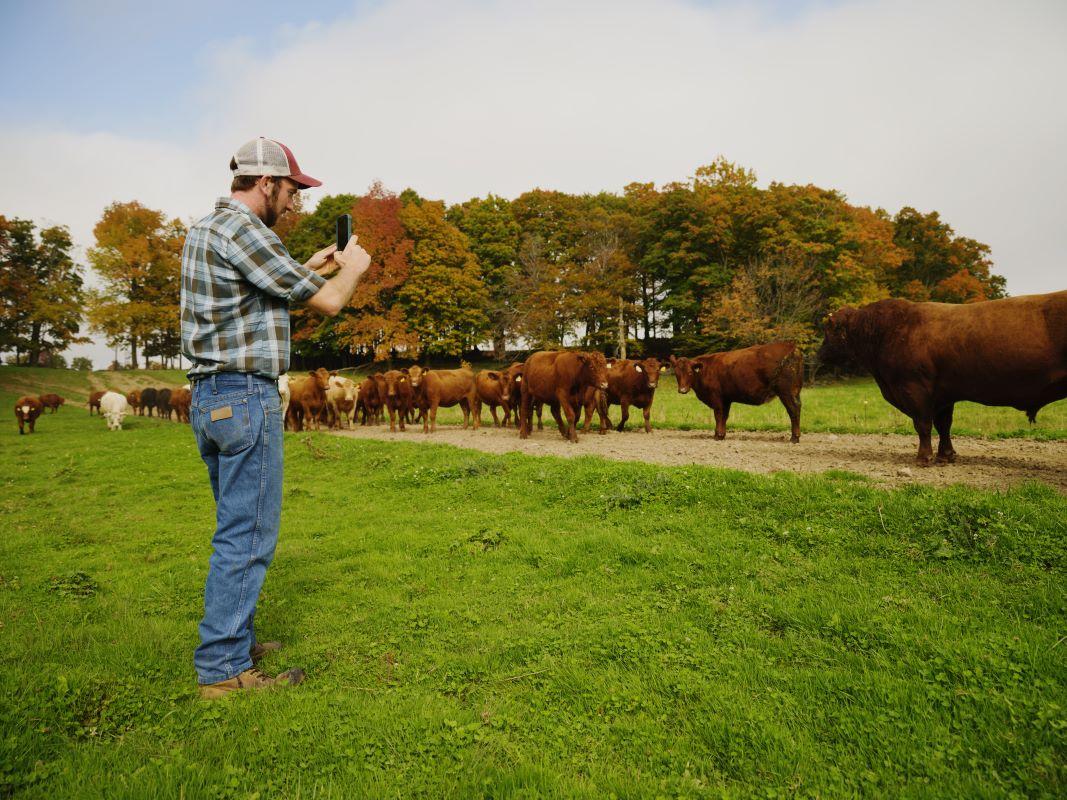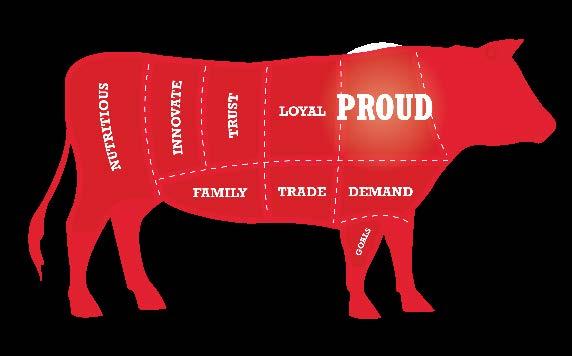E Newsletter



continued on pages 2-5
Ministers expressed their concerns regarding the extreme weather situations currently impacting producers across the country, including drought and wildfires. Ministers committed to working together expeditiously to share data and complete AgriRecovery assessments. Ministers also committed to ensuring that producers have access to a full suite of Business Risk Management (BRM) programs that are timely and reliable. In view of this, Ministers committed to continuous improvement of BRM programs to support farmers and ranchers. In order to ensure timeliness, simplicity and predictability of AgriStability, Ministers agreed to the implementation of an optional new model.
 The Honourable Marie-Claude Bibeau, federal Minister of Agriculture and AgriFood (centre) along with F/P/T Ministers of Agriculture from across Canada. (Photo credit: Agriculture and Agri-Food Canada)
The Honourable Marie-Claude Bibeau, federal Minister of Agriculture and AgriFood (centre) along with F/P/T Ministers of Agriculture from across Canada. (Photo credit: Agriculture and Agri-Food Canada)
Ministers support the importance of traceability measures and stated the necessity of ensuring that measures are designed to reflect operational realities.
Ministers agreed that innovation, scientific research and development, and collaboration play key roles in continuing to increase productivity and economic growth, while protecting the environment. Ministers highlighted the importance of building on a foundation of strengths and expertise from across jurisdictions and noted actions already taking place across the supply chain to reduce greenhouse gas emissions, sequester carbon and improve the environmental and economic sustainability of the sector. Ministers continue to champion the work of industry partners, in building a clean future that is both sustainable for our planet and supports farmers’ economic livelihoods. Ministers committed to continuing to work with stakeholders to respond to the challenge of climate change and extreme weather events, such as drought and wildfires, and to meet the growing demands for healthy, sustainable and nutritious food. The federal government presented on the Sustainable Agriculture Strategy and provinces and territories shared their current strategies and initiatives. Ministers emphasized the importance of science and evidence-based decision-making in improving the long-term growth, resilience and sustainability of the agriculture and agri-food sector.
Ministers recognized that Canadian producers need effective tools to manage weeds, pests and plant diseases. Ministers agreed that science and evidence-based decision-making on regulating crop protection products is paramount. They also recognized the importance of supporting research into pest management tools, practices and solutions such as biopesticides and integrated pest management approaches. Following the Pest Management Regulatory Agency (PMRA) presentation, and recognizing the difficulties faced by our producers, Ministers agreed to create an FPT working group which will explore the challenges of pesticide management.
Ministers are committed to improving supply chain resiliency and as such, received an update from industry on the Grocery Sector Code of Conduct consultations held in May 2023.
Ministers recognized the important steps taken by industry towards the implementation of the Grocery Sector Code of Conduct by year’s end. Ministers were also briefed on the plan to establish an office which will provide training, education, dispute resolution services and oversight, as well as send a signal to Canadian consumers that the grocery sector is improving its transparency. Ministers supported the industry-led collaborative process and remained open to discussing how governments can support this effort going forward, including through short-term financial support for the creation of the office. Ministers remained united in calling for the participation of all key players in the industry, who will support its operations.
Ministers advanced talks on the federal government’s commitment in Budget 2023 of $57.5 million over 5 years (starting in 2023-24) and $5.6 million in ongoing funding to support and establish a Foot-and-Mouth Disease (FMD) vaccine bank for Canada, and to develop FMD response plans with provinces and territories. Ministers agreed on a collaborative approach, working with industry, to support this project which will enable the Canadian Food Inspection Agency to secure a strategic reserve of vaccines to help Canada’s livestock industry against FMD outbreaks.
Ministers discussed international trade and market diversification, including ongoing trade negotiations with key partners. Discussions also centred around collective efforts to position Canada as a trusted and sustainable supplier of choice to the Indo-Pacific region by leveraging Canada's first-ever Indo-Pacific Agriculture and Agri-Food Office, which will be in Manila,
FPT Ministers of Agriculture – cont. from page 1
Philippines, as well as existing federal, provincial and industry resource investments in the region.
Ministers also discussed labour, including recent disruptions at the Port of Vancouver, Specified Risk Material, Clean Fuel Regulations as well as honey bee health. In addition, Ministers highlighted advancements on interprovincial trade pilots and committed to continue the progress on this issue. For more information, please see below: the Backgrounder: Summary of Items from the 2023 Annual Meeting of Federal, Provincial and Territorial (FPT) Ministers of Agriculture.
The next Annual FPT Ministers' meeting will be held in Whitehorse, Yukon, in July 2024. The Ministers who were not in attendance in Fredericton were represented by other officials (Nunavut was not represented at the meeting).
Quotes
"By working together, we can continue to overcome the challenges facing the agriculture and agri-food sector and seize the opportunities for growth. Underscored by the launch of the Sustainable Canadian Agricultural Partnership, our ambitious vision for the future of the sector will ensure that producers, ranchers and processors have the tools they need to manage risk, grow their production, productivity, and profitability while remaining good stewards of the land. This vision is also at the heart of the Sustainable Agriculture Strategy, being developed in collaboration with industry."
- The Honourable Marie-Claude Bibeau, federal Minister of Agriculture and Agri-Food
"The agriculture and agri-food sector is an important component of the New Brunswick and Canadian economy, while also feeding Canadians and those across the globe. The sector is resilient and sustainable and will prosper by seizing opportunities and addressing challenges through a collaborative approach.
During our meetings this past week, we discussed many important topics including Business Risk Management programs, animal health, environment and labour. As the provincial-territorial co-chair, I am pleased with the commitments all parties made to support and advance the agriculture and agri-food sector and help it succeed."
- The Honourable Margaret Johnson, Minister of Agriculture, Aquaculture and Fisheries, New Brunswick
Quick facts
• Canada's agriculture and agri-food sector contributed $143.8 billion to national gross domestic product (GDP) in 2022, accounting for 7% of national GDP.
• Exports of agriculture and agri-food products continue to grow, worth nearly $93 billion in 2022 compared to $82 billion in 2021.
• In 2022, Canada's agriculture and agri-food system employed 2.3 million people (11.4% of total jobs in Canada).
• Sustainable CAP is a 5-year, $3.5-billion investment by Canada's federal, provincial and territorial governments that supports Canada's agri-food and agri-products sectors. This includes $1 billion in federal programs and activities and a $2.5 billion commitment that is cost-shared 60% federally and 40% provincially/territorially for programs that are designed and delivered by provinces and territories.
FPT Ministers of Agriculture – cont. from page 1
Backgrounder: Summary of Items from the 2023 Annual Meeting of Federal, Provincial and Territorial (FPT) Ministers of Agriculture
From: Agriculture and Agri-Food Canada Business Risk Management (BRM)
Ministers were briefed on progress on a range of BRM program changes resulting from the Sustainable CAP agreement, including to AgriStability, and BRM and the environment. On AgriStability, the new model will be offered on an optional basis to producers in applicable provinces and territories in a flexible way that ensures producers have access to the program in a manner that meets their needs. Ministers also raised other potential BRM improvements for further analysis to support crops and livestock.
Ministers discussed progress on piloting AgriInsurance premium rebates for producers who adopt practices that reduce production risks and have a positive environmental benefit. The federal government is also committed to working with interested provinces to continue evaluating the option of whole farm AgriInsurance, which has the potential to reduce premiums for farmers and encourage diversification of crops. Ministers also noted progress on their shared commitment that, starting in 2025, producers with allowable net sales of $1 million or more will need an agrienvironmental risk assessment to receive government contributions through AgriInvest.
Livestock Price Insurance
The federal government and the maritime provinces (New Brunswick, Nova Scotia and Prince Edward Island) have agreed to continue discussions on a Livestock Price Insurance program for producers in those provinces. Ontario and Quebec look forward to discussions to explore support for their programs.
Labour
Recognizing the acute labour challenges being faced by the agricultural sector, Ministers highlighted the importance of working together to remove barriers for workers seeking employment opportunities and committed to sharing ideas and approaches. In this context, Ministers received a presentation on the Atlantic Immigration Program which is both a pathway to permanent residence for skilled foreign workers and helps employers hire qualified candidates for jobs they haven’t been able to fill locally.
Interprovincial trade
Ministers were provided with an update on the interprovincial food trade pilot projects they had requested at their November 2021 meeting and whose tangible progress they supported at their July 2022 meeting. The pilots aim to: address situations like Lloydminster, which lies on the Alberta-Saskatchewan border; explore solutions for meat processing in rural areas that lack slaughter availability, such as in OntarioQuebec and Ontario-Manitoba border regions; and explore solutions for Ontario’s “Ready to Grow” meat plants for high-volume provincially regulated meat businesses seeking to test market opportunities in other Canadian provinces or territories.
Honey bee health
Ministers agreed to continue working together with industry representatives and other stakeholders through the Industry-Government Working Group on Bee Sustainability. This Working Group will continue to consider issues affecting Canadian honey bee health and explore both short and long-term solutions for the sector with the aim of helping to improve the sustainability of the Canadian honey bee sector, including on matters relating to the mortality of honey bee colonies, the overwinter
FPT Ministers of Agriculture – cont. from page 1
honey bee colony losses and the impact of varroa mites. Ministers also discussed the new risk assessment that the Canadian Food Inspection Agency will be undertaking to evaluate the risks associated with the importation of honey bee packages from the United States.
Specified risk material
Ministers also noted the ongoing collaboration between the Canadian Food Inspection Agency and the cattle sector to better understand the challenges with Bovine Spongiform Encephalopathy (BSE). Ministers also emphasized the importance of completing the work on a specified risk materials analysis. Ministers discussed considerations and possible approaches to alignment with the United States on the issue of specified risk material and disposal requirements.


Photography
2023! The competition theme is
Click on the image for info, rules and to submit photos. Don't delay; submission deadline is Aug 4!

FPT Ministers of Agriculture – cont. from page 1
You're invited to participate in the inaugural Canadian Beef Industry
Showcase during #CDNBeefConf
“PROUD.”
Government of Canada announces plans to create a vaccine bank for Foot and Mouth Disease in animals
(July 20, 2023 Canadian Food Inspection Agency News Release) Today, as part of the annual conference of Federal, Provincial and Territorial (FPT) Ministers of Agriculture, Ministers confirmed their commitment to respond to animal disease outbreaks through the establishment of a Foot-and-Mouth Disease (FMD) vaccine bank. Budget 2023 committed $57.5 million over 5 years, with $5.6 million ongoing, to the Canadian Food Inspection Agency (CFIA) to establish an FMD Vaccine Bank for Canada, and to develop FMD response plans.
This funding will provide Canada with a dedicated vaccine source to support the CFIA and industry in the event of an outbreak. The bank will be another tool for Canada to support animal disease prevention and management, and help stop the spread of disease in an outbreak. This investment complements Canada's current access to vaccines through the North American Foot and Mouth Disease Vaccine Bank (NAFMDVB), ensuring readily available vaccines for Canadian producers.
Canada's new FMD Vaccine Bank will consist of concentrated FMD vaccines that can be rapidly transformed into usable vaccines in a timely and cost-effective manner. Vaccines are an important part of an effective and efficient disease response that will help to maintain public confidence in the Canadian food supply, limit the economic impact on Canadian producers, and help mitigate prolonged market disruptions to trade.
At the annual FPT conference, Ministers discussed the guiding principles of Canada's FMD vaccine bank, with a focus on:
• optimizing the benefit for Canada
• proportional contribution
• supporting sector resiliency
• collaborating across sectors
• remaining forward looking and innovative
In fall 2023, the CFIA will launch a transparent and competitive procurement process to establish Canada's FMD Vaccine Bank.
Quotes
"The creation of a vaccine bank for Foot-and-Mouth Disease in Canada means that during a potential outbreak, we have the ability to reduce the duration and spread by half. The new vaccine bank will add to Canada's existing emergency response plans to limit the impacts of an FMD outbreak, support our farmers and the livestock industry in Canada. The FMD Vaccine Bank is one part of Canada's commitment to protect the health of our animals, the resilience of our livestock industry, and enable Canadian producers to continue to access international markets."
– The Honourable Marie-Claude Bibeau, Minister of Agriculture and Agri-Food
"The FMD Vaccine Bank is a key investment in emergency preparedness to ensure the health of Canadian livestock. Having a vaccine on hand in the event of an FMD outbreak will reduce the potential number of animals to be infected and in turn reduce the magnitude of a complex multi-species emergency response effort. We live in a global economy which relies on the movement of people, animals and goods for trade. This means a potential outbreak of FMD is only one flight away. Having the FMD Vaccine Bank in place is a critical piece of insurance for Canadian farmers."
– Colleen McElwain, Executive Director, Animal Health Canada
Quick facts
• Canada has been free from FMD since 1952, and strict measures are in place to prevent the disease from entering Canada.
• FMD is a devastating disease. It is a severe, highly communicable viral disease of cattle and swine. It also affects sheep, goats, deer and other cloven-hoofed animals. Many affected animals recover, but the disease leaves them weakened and debilitated.
• FMD is not a public health risk and is not considered a food safety issue.
• An outbreak would impact Canada's ability to export these animals to other markets and could cost an estimated $19.4B to $65.2B in potential impacts on the economy.
Manitoba Government Reconstructing Bridge Severely Damaged By Fire on Provincial Road 311
(July 20, 2023 Province of Manitoba News Release)
The bridge over Manning Canal on Provincial Road (PR) 311 will be replaced following a fire in May Transportation and Infrastructure Minister Doyle Piwniuk announced.
“This bridge sees over 3,000 vehicles per day and is an important route in the Blumenort area,” said Piwniuk. “We are working to have the bridge reconstructed and re-opened in the quickest timeline possible to minimize traffic impacts in the area.”
The bridge on PR 311 between Provincial Trunk Highway (PTH) 216 and PTH 206 was 42 years old and damaged beyond repair by fire. The bridge has since been dismantled to ensure the
safety of the site and a route detour has been put in place.
The Manitoba government is reviewing various options for reconstructing the bridge that considers the traffic needs in the area, with a priority placed on re-opening to traffic as soon as possible. The new bridge will have a higher capacity for overloaded vehicles and is expected to be open to traffic in 2025, the minister added.
For more information on Manitoba Transportation and Infrastructure’s projects, visit the department’s interactive map at https://gov.mb.ca/mit/mipmap/map.html
In the upcoming provincial election, why should agriculture matter to all candidates?
Find out next Thursday at KAP’s July Advisory Council meeting taking place virtually on July 27 at 9 a.m. The farm election panel will include Manitoba Beef Producers President and District 8 director, Matthew Atkinson. Click the graphic below to learn more and register!

Manitoba Government Increases Funding to Enhance Fight against Chronic Wasting Disease
(July 19, 2023 Province of Manitoba News Release) The Manitoba government is investing an additional $880,000 to help prevent the spread of chronic wasting disease (CWD), Natural Resources and Northern Development Minister Greg Nesbitt announced.
“Chronic wasting disease is a significant threat to the health of Manitoba’s wildlife and our collective efforts in conservation, and we continue to take action to contain and eradicate its spread within the province,” said Nesbitt. “This additional investment will expand testing capacity, with a goal of reducing processing times for the 2023 hunting season. Testing more animals more often is critical to detecting the disease early and developing effective strategies to protect wildlife populations for the future.”
CWD is an incurable, fatal disease that affects members of the deer family (cervids) including mule deer, white-tailed deer, elk, moose and caribou. Animals infected with CWD may appear healthy until the later stages of the disease. If the disease spreads and becomes endemic to Manitoba, there is a serious risk that CWD will threaten the health of all cervid populations in Manitoba.
To support early detection of CWD and respond to identified cases, Budget 2023 provided an additional $880,000 to increase the capacity of Manitoba’s mandatory sample program and reduce the turnaround time of test reports to mitigate human and animal health risks, the minister noted. This additional funding will also be used to increase staff capacity including another wildlife biologist position to support enhanced prevention, surveillance and monitoring.
“Manitoba hunters take chronic wasting disease and its prevention seriously,” said Carly Deacon, directing manager, Manitoba Wildlife
Federation. “The increased funding and staffing levels will certainly assist with improving the CWD surveillance programs.”
A total of 22 positive cases have been identified since CWD was first detected in Manitoba in 2021. Cases were identified from mandatory biological sampling submissions of hunterharvested animals as well as animals harvested by Manitoba Natural Resources and Northern Development staff as part of ongoing CWD management efforts. The Department of Natural Resources and Northern Development anticipates the number of cases will rise as further testing is completed.
The 2022-23 hunting season saw a substantial increase in biological sampling submissions – up to 6,000, compared to an average of 1,000 before CWD was discovered in Manitoba. The Manitoba government is reviewing the CWD surveillance program efforts to simplify sample and data submission, streamline sample processing and provide more opportunities for hunters to engage in the program.
CWD is not known as a human health risk but Health Canada has recommended that meat from a CWD-infected animal not be consumed. It is mandatory for licensed hunters in areas where CWD is a concern to have harvested animals tested, practise safe carcass-handling protocols and avoid consumption of any animal that has tested positive for CWD. Samples results from harvested animals will be posted, once available, at www.gov.mb.ca/nrnd/fishwildlife/wildlife/cw d-results/cwd-results.html.
Hunters with questions or concerns about an animal that has been harvested can email cwd@gov.mb.ca or call 1-204-638-4570. For more information, visit www.manitoba.ca/cwd
Manitoba Government Continues Work on Perimeter Highway
(July 18, 2023 Province of Manitoba News Release) Work to upgrade the Perimeter Highway to meet freeway standards is ongoing, with a number of projects completed, and continuing works planned for this summer, Transportation and Infrastructure Minister Doyle Piwniuk announced.
“The Perimeter Highway around Winnipeg is one of the most important economic corridors in Manitoba and across the country, providing a key link to the Trans-Canada Highway and to the U.S. border,” said Piwniuk. “Substantial progress has already been made over the last four years and I’m looking forward to the further steps forward we will make this summer.”
The Manitoba government developed a 10-year investment plan to support the roadmap of longterm improvements required to upgrade Winnipeg’s Perimeter Highway to freeway standards. To move this work forward, consultants were engaged to undertake functional design reviews of the South Perimeter Highway, which was completed in 2020, and the North Perimeter Highway, which began in 2022 and is expected to be completed by December 2024, the minister noted.
To address immediate safety concerns, the Manitoba government completed work, including extensive median closures and removal of uncontrolled access points on both the South Perimeter Highway and North Perimeter Highway, as well as intersection improvements and service road upgrades to support alternate routes for these closures. These improvements have been critical for traffic safety on the Perimeter Highway, both at present and for future development, Piwniuk said.
The minister noted a number of projects are also underway and in the planning stages including:
• new interchange at St. Mary’s Road, one of Manitoba’s busiest trade corridors, with construction started in 2022 and
anticipated to be complete in summer 2024;
• new interchange at PTH 3 (McGillivray Boulevard) with preliminary functional design work expected to be completed in late 2023;
• new interchange at St. Anne’s Road is in development, with design work expected to begin in 2024-25;
• paving work on the north PTH 101 service road from Provincial Road (PR) 236 to Lilyfield Road near PTH 7, with construction expected to be completed in 2023; and
• median opening closures and uncontrolled access point removals, which will be ongoing through the 2023 construction season.
The minister noted that motorists using the Perimeter Highway should expect delays, and are advised to exercise caution and patience during construction.
Manitoba Transportation and Infrastructure will update impacts to traffic through the Manitoba 511 information system at www.manitoba511.ca/en/index.html.
The Perimeter Highway renewal work supports the Manitoba government’s 2023 Multi-year Infrastructure Investment Strategy, which outlines $4.1 billion in strategic investment in roads, highways, bridges, airports and flood protection over the next five years, and confirms the Manitoba government’s commitment to building the economy and investing in the future, the minister noted.
For more information on the multi-year strategy, visit https://gov.mb.ca/mit/myhis/index.html.
BACKGROUND INFORMATION ATTACHED
Provincial Trunk Highway (PTH) 100 and 101
The Manitoba government is working to upgrade both the South Perimeter Highway PTH 100 and North Perimeter Highway PTH 101 to a freeway standard, and has developed a 10-year investment plan to support this initiative.

A design review of PTH 100 began in 2018 and was completed in 2020, while a design review for PTH 101 was initiated in 2022 and is expected to be completed in 2024.
Removal and closure of uncontrolled (i.e. at-grade unsignalized) median openings and access points along PTH 100 and PTH 101 began in 2019 in response to a safety review of the Perimeter Highway. These closures and removals increase safety along the highway and support the plan to upgrade the Perimeter Highway to a freeway standard.
Median and access point removals are continuing through the 2023 construction season and include:
PTH 101 North Perimeter;
o removal of the access at Sturgeon Road,
o removal of the access at Prest Avenue,
o removal of accesses and median opening at Road 63N, PTH 100 South Perimeter;
o removal of access at Oakland Road,
o removal of access at LaVerendrye Road,
o removal of access at Four Mile Road,
o completing the construction of the west service road between Oakland Road and Wilkes Avenue,
o Rural Municipality of Headingley to remove the access at Caron Road after the Rockall service road is complete; the removal is to be repaid by Manitoba Transportation and Infrastructure as part of agreement

Construction work planned or underway includes the following, for a total investment of $17.3 million:
PTH 100, construction of a new west service road for five kilometres connecting the Oak Bluff Industrial Park to Wilkes;
paving north service road on PTH 101 from PR 236 to PTH 7;
PTH 101, extending Paddock Road to CentrePort Canada Way; and
paving on PTH 100 from PR 427 to PTH 3 (northbound) and the Wilkes Interchange.
•••••••••••••••••••••••••••••••••••••••••••••••••• ••••••••••••
Construction work completed in 2023 includes the following, for an investment of $4.9 million:

paving on PTH 100 from PTH 1W to PTH 3 (southbound);
paving of Holmes Road on the north side of PTH 101;
paving on PTH 101 from PTH 8 to Red River Bridge (eastbound); and
paving on PTH 101 from PR 204 to 1 kilometre east (eastbound and westbound)
Canada and Manitoba Governments to Provide Up To $1 Million to Support Training and Resource Development for Agricultural Industry
(July 18, 2023 Province of Manitoba News Release) The governments of Canada and Manitoba are investing up to $1 million through the Sustainable Canadian Agricultural Partnership (Sustainable CAP) to support learning activities, knowledge transfer and resource development for local agricultural organizations, federal Agriculture and Agri-Food Minister MarieClaude Bibeau and Manitoba Agriculture Minister Derek Johnson announced.
“The Industry Development Initiatives program will create opportunities for producers to learn from each other through a variety of innovative learning tools,” said Bibeau. “Engaging agriculture employees in training can also lead to higher retention, which strengthens resiliency of the sector.”
The Sustainable CAP Industry Development Initiatives program was designed to meet the needs of organizations that support the agriculture and food sectors, including industry organizations, associations, commissions, nonprofits, boards and Indigenous governments, communities or organizations.
“Stakeholders have told us they want more funding for formalized mentorship and peer-topeer training,” said Johnson. “This assistance from both levels of government will support such learning and development opportunities, as well as conferences and other educational events.”
The funding will support agriculture organizations to develop innovative resources and offer training opportunities that improve the capacity and competitiveness of the sector. Improvements to the program are based on feedback from engagement efforts over the last several years.
“The annual Direct Farm Marketing Conference brings together fruit and vegetable growers, livestock producers and other direct marketers from across the province to network and learn,” said Kristie Beynon, executive director, Direct Farm Manitoba. “The funding Direct Farm Manitoba has received through previous agricultural partnerships has been vital to the success of the conference, the only event of its kind in Manitoba. We look forward to working with Manitoba Agriculture again on this annual event, and appreciate the options introduced in the Sustainable CAP to better serve smaller organizations.”
Eligible organizations can receive up to $25,000 per organization over the duration of the program. Smaller organizations have found that cost-sharing projects can be difficult and options for organizations now address this challenge, Johnson added.
The Sustainable Canadian Agricultural Partnership is a five-year, $3.5-billion investment by Canada's federal, provincial and territorial governments that supports Canada’s agriculture, agri-food and agri-products sectors. This includes $1 billion in federal programs and activities, and a $2.5-billion commitment that is cost-shared 60 per cent federally and 40 per cent provincially/territorially for programs that are designed and delivered by provinces and territories.
For more information on Manitoba programs under the Sustainable Canadian Agricultural Partnership, visit www.manitoba.ca/scap
To access the Industry Development Initiatives application and guide, visit https://manitoba.ca/scap/resiliency/indust ry-development-initiatives.html.



 The Honourable Marie-Claude Bibeau, federal Minister of Agriculture and AgriFood (centre) along with F/P/T Ministers of Agriculture from across Canada. (Photo credit: Agriculture and Agri-Food Canada)
The Honourable Marie-Claude Bibeau, federal Minister of Agriculture and AgriFood (centre) along with F/P/T Ministers of Agriculture from across Canada. (Photo credit: Agriculture and Agri-Food Canada)







